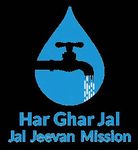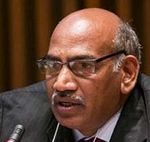Translating the Spirit of the Jal Jeevan Mission into Ground-Level Action
←
→
Page content transcription
If your browser does not render page correctly, please read the page content below
Online Training Program on
Translating the Spirit of the
Jal Jeevan Mission into
Ground- Level Action
Building committed, responsive and strong leadership of mid-level
managers to successfully implement the JJM
BATCH-I BATCH-II
September 21-22, 2021 September 30-October 1, 2021
PROGRAM DIRECTORS: Prof PVS Prakasam | Mr Murali Ramisetty | Dr Snehalatha MekalaBackground
The Jal Jeevan Mission (JJM) was launched
by the Honourable Prime Minister of India
on August 15, 2019. The mission, under a
Centre -State par tnership, aims to equip
ever y village household with a Functional
Household Tap Connection (FHTP) within
five years.
The JJM envisages an adequate potable
water supply of at least 55 litres per capita/
day (lpcd) of the quality prescribed by Programme Objectives
BIS 10500:2012 to every household on a
regular, long-term basis. To realise this The main objective of this programme is to
vision, managers of Public Health and Rural impart knowledge on JJM guidelines, inspire
Water Supply Departments must have and motivate mid-level managers to implement
comprehensive knowledge of JJM guidelines. these guidelines in the spirit of SGD 6.
Mid-level managers must be motivated to
implement the JJM guidelines in spirit and The specific objectives are:
letter, with a clear understanding of what
the guidelines say; the contextual spirit, 1. T o ensure a thorough understanding of
rationale and significance of the guidelines; the vision, objectives and operational
and how the guidelines should be guidelines of the JJM, emphasising
implemented to achieve India’s commitment the distinction between the new JJM
to UN Sustainable Development Goal approach and previous Centre-driven
(SDG) 6 (Clean Water and Sanitation: Ensure RWS missions and programmes.
availability and sustainable management of
water and sanitation for all). 2. T o enable mid-level managers to understand
their role, responsibilities and significance in
Centre for Organization the success of the JJM.
Development 3. T o build committed, efficient and
responsive leadership among mid-
The Centre for Organization Development level managers to pursue the new,
(COD) is a Key Resource Centre empanelled transformative approach to water
by the Ministry of Jal Shakti, Government supply management.
of India under the JJM to organize training
programmes for mid-level management. 4. T o capacitate mid-level managers to
Established in 1980, COD is a widely quickly gain implementation speed and
recognised and much sought-after Centre play a harmonious role between higher-
of Excellence in executive education, level decision-makers and delivery
consulting and research on vital aspects of agencies / personnel on the ground.
organization development encompassing
strategy, structure, culture, change 5. T o lay out the broad roadmap and action
management and organization behaviour. steps to be initiated by mid-level managers
The Department of Scientific and Industrial towards implementing the JJM in their
Research, Government of India, has institutions / jurisdictional areas.
recognised COD as a centre for doctoral
research.Contents Audience
This programme covers the following topics: The programme is intended for officials from
the District Water and Sanitation Mission
1. E volution and historical analysis of (DWSM), Superintending Engineers, Executive
water supply programmes and the Engineers, water utility managers, water
current status of drinking water access testing laboratory personnel from Public
in India. Health and Engineering Departments (PHEDs),
Rural Water Supply (RWS) departments, Public
2. V
ision, mission, objectives and key Works Departments (PWDs), etc.
components of the JMM.
Schedule
3. Strategy for JMM implementation.
This 2-day programme is offered in two
4. S teps to be followed for JMM batches, each with up to 50 participants
implementation and processes for accepted on a first-come-first-serve basis.
developing state, district, and
village -level action plans. Batch 1: September 21-22, 2021
5. I nstitutional mechanisms for Batch 2: September 30-October 1, 2021
implementing the JMM.
Daily schedule: Begins at 10:30 AM
6. T echnological interventions, innovations, and concludes at 1:30 PM with one
Information, Education and Communication 15-minute break
(IEC) approach under JJM.
7. W
ater quality monitoring and Registration & Fees
sur veillance.
The programme is free for participants; as a
8. F inancial planning, costing, funding, Key Resource Centre, COD is funded by the
sharing and fund release patterns, JJM to deliver the training.
effective resource allocation and
deployment, measuring progress, and Please fill out the online registration form to
monitoring and evaluation frameworks reserve your seat.
under the JMM.
Nominations and individual registrations
Methodology must be submitted on or before September
15, 2021.
This programme is delivered through lecture
sessions, presentations, and case studies from Certification
subject matter experts and an experienced
senior practitioner from the Rural Water Supply Upon programme completion, attendees
and Sanitation Department. Highly experienced will receive a Certificate of Participation
sector specialists will motivate participants by from COD and become members of the COD
sharing their rich experience. Alumni Association.
The programme will be held online using Zoom.Project Coordinator Programme Directors
M r Mura li R amiset t i is E xec utive Direc tor of M oder n
Architec t s fo r Rural I n dia ( MARI, an N GO) an d a
senio r devel opment profession al wh o h as design ed
and imp l emented commun it y- centred r ural water
su p p l y and san itation improvement proj ec ts for over
20 years. H e has r ic h an d diver sified exper ien ce in
imp l ement ing development proj ec ts to en h an ce
l ivel iho o d o ppor tun ities, sustain able agr iculture,
p ar t icip ato r y forestr y man agement, restoration
o f t radit io nal water bodies, integrated water sh ed
devel o p ment, an d promotion of climate ch an ge -
resil ient cro ppin g systems, an d h as organ ized
cap acit y b uil din g programmes for development
p rac t it io ners in gover n ment an d n on - gover n mental Mr Murali Ramisetti
ag encies includin g r ural Water, S an itation an d
Prof PVS Prakasam H ygiene ( WA SH) .
Business Strategy, HR,
General Management As t he R egio n al Conven er of th e Freshwater Ac tion N et wor k S outh As i a
(FA NSA) fro m 2 0 0 8 to 2 0 2 0 , M r R amisetti h as contr ibuted ex ten sive l y to
Prof PVS Prakasam is a hig h-l evel p olic y discussion s on WAS H issues focused on equitable, i nc l us i ve
and sust ainable WAS H progress. He h as led several studies on rej u ve nat i on
Fellow of the Institute o f t radit io nal water bodies, faecal waste man agement, an d par tic ip ator y
of Cost & Management ap p ro aches towards WAS H in r ural areas, providin g valuable in put to t he
Accountants of India. He design o f p o l ic y an d programme inter vention s at th e region al, n ati ona l a nd
holds a Post Graduate su b nat io nal levels.
Diploma in Industrial
Engineering from the
National Productivity
Council and a BTech in
Civil Engineering from
Nagarjuna University.
D r Snehalatha M ek ala is the cur re nt R egional
Prof Prakasam has over Coordinator of FANSA. She holds a PhD in Rural
3 decades of experience D evelopment and has 22 years of exper ience
in per formance and in the water and sanitation sec tors. She
process benchmarking., was I mpac t Advisor for the UK R esearch and
management consulting, I nnovation RUST projec t (2018-2020), National
business planning, R esearch Coordinator for the IR C Communit y
organization structure, Water Plus projec t (2013-2016), and Countr y
per formance management Coordinator for IR C WASHCost (2008-2012)
and improvement, and
growth strategy. He has Her professional interests and exper tise
consulted with several a r e i n t h e a r e a s o f w a t e r, s a n i t a t i o n a n d
major public and private hygiene ser vices, capacity building,
sector organizations in Dr Snehalatha Mekala e q u i t a b l e a n d i n c l u s i v e WA S H p r o g r e s s , a n d
the areas of business Pa r t i c i p a t o r y Po v e r t y A s s e s s m e n t s . S h e w a s
transformation, growth a m e m b e r o f t h e Wo r k i n g G r o u p o n N a t i o n a l R u r a l D r i n k i n g Wa t e r a n d
strategy, managing S a n i t a t i o n f o r m e d b y t h e D e p a r t m e n t o f D r i n k i n g Wa t e r a n d S a n i t a t i o n ,
people, processes and formulating its five -year plan.
change, and setting up Dr Mekala has under taken several research studies for international, regional
frameworks for long-term and national organizations including UN and government agencies, focusing
sustained growth and on the sustainability, equity and human rights aspects of WASH. She is author
institution-building. or co-author of over 20 journal papers and 50 repor ts, and has contributed
He is career coach to extensively to knowledge -building in the development sector. She is a
executives across all levels regular contributor to high-level professional platforms including Stockholm
and in a wide range of Water Week, the Water and Health Conference, the World Water Forum,
industr y sectors. SACOSANs, and the par tnerships of Sanitation and Water for All.Get in touch with us!
Centre for Organization Development
Metro Pillar No. C-1735, PO Cyberabad
Madhapur
Hyderabad 500 081
Telangana - INDIA
+91 40 6662 2315 +91 40 66668177
upendra@codhyd.org www.codhyd.org
Empowering Executives and EnterprisesYou can also read
























































